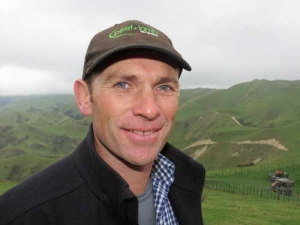Red meat rebound
The red meat sector is poised for a strong rebound this season, with export receipts forecast to top $10 billion and farm profitability to almost double.
 Beef + Lamb chairman James Parsons says farmers want an organisation to represent their interests and one that provides them with clear demonstrable value.
Beef + Lamb chairman James Parsons says farmers want an organisation to represent their interests and one that provides them with clear demonstrable value.
The 2015 sheep and beef levy referendum has ended showing apathetic voter turnout – around the same number as last voted six years ago.
As at 10am last Thursday, 6296 farmers had cast their votes, representing only 37% of the voting papers sent out; the previous referendum in 2006 recorded a 39% turnout.
Voting ended at 5pm on Thursday; a strong ‘yes’ vote was on the cards.
Under the Commodity Levies Act 1990 Beef + Lamb NZ is required to ask sheepmeat and beef producers (including dairy farmers through their cull cows) if they wish to continue funding activities and programmes for six years from 2016-22.
The current sheep and beef levy orders (the mechanism that allows a levy to be collected) run out in February 2016.
At least 50% of voting farmers, by both number voting (‘one farmer, one vote’), and their number of stock units (weighted vote), need to support continuing a levy for a new levy order to be approved.
BLNZ held farmer meetings throughout the country to explain what the industry-good organisation is planning
Chairman James Parsons says while each region has its own issues and climatic challenges, common themes have consistently been raised in discussions.
“Overwhelmingly farmers have said they want an organisation to represent their interests, but importantly one that provides them with clear demonstrable value,” he says.
One area of common interest is the market access work. Farmers seem united in the need for BLNZ to work on their behalf alongside the Government to ensure the best trade arrangements for farmers and ultimately that all tariffs are eliminated.
Last year this work saved $161 million that would otherwise have gone on tariffs if free trade agreements like those with China and Taiwan had not been in place, Parsons says.
“There is a lot of interest in the potential for our sector through the Trans Pacific Partnership and we fully support the Government’s insistence that we must strike a high quality deal.
“Some farmers have voiced disquiet at the possibility the deal could weaken New Zealand’s sovereignty, but there was widespread acknowledgment that NZ producers must remain competitive and be a part of the deal if it is to progress."
One of New Zealand’s longest-running pasture growth monitoring projects will continue, even as its long-time champion steps away after more than five decades of involvement.
The Insurance & Financial Services Ombudsmen Scheme (IFSO Scheme) is advising consumers to prepare for delays as insurers respond to a high volume of claims following this week's severe weather.
Additional reductions to costs for forest owners in the Emissions Trading Scheme Registry (ETS) have been announced by the Government.
Animal welfare is of paramount importance to New Zealand's dairy industry, with consumers increasingly interested in how food is produced, not just the quality of the final product.
Agriculture and Forestry Minister Todd McClay is encouraging farmers and growers to stay up to date with weather warnings and seek support should they need it.
The closure of SH2 Waioweka Gorge could result in significant delays and additional costs for freight customers around the Upper North Island, says Transporting New Zealand.